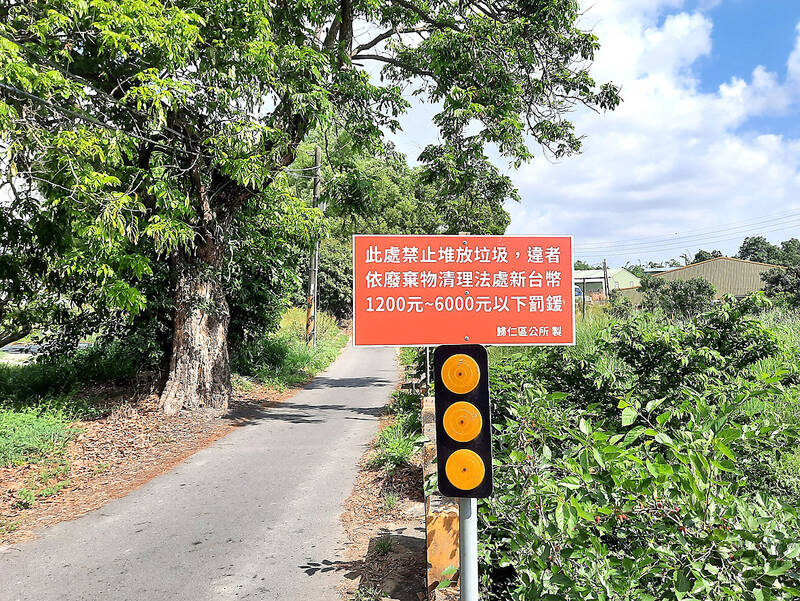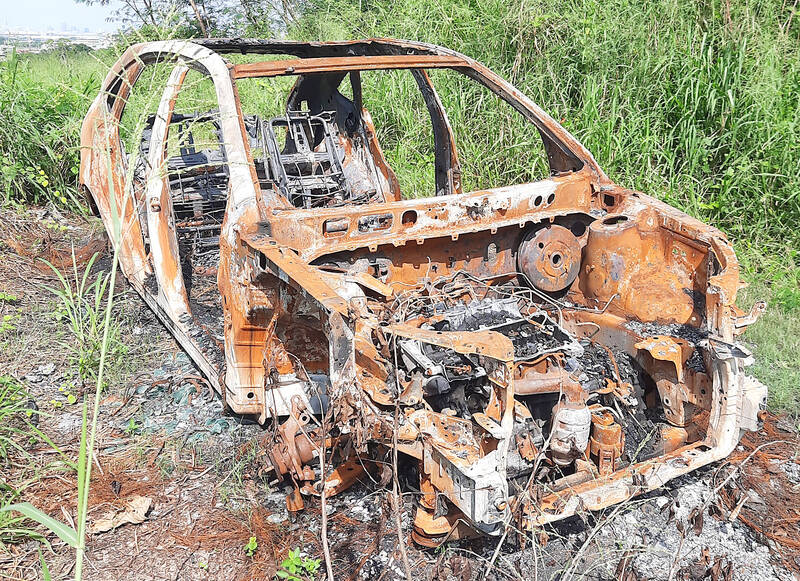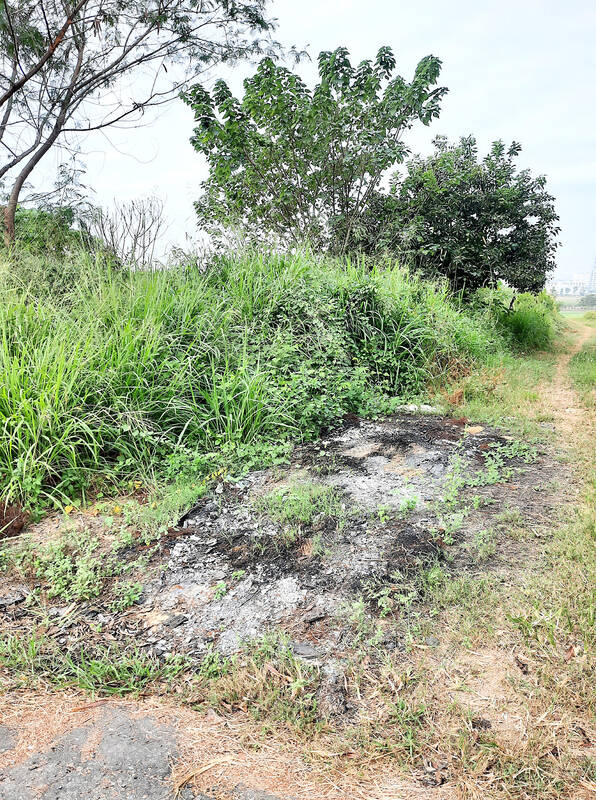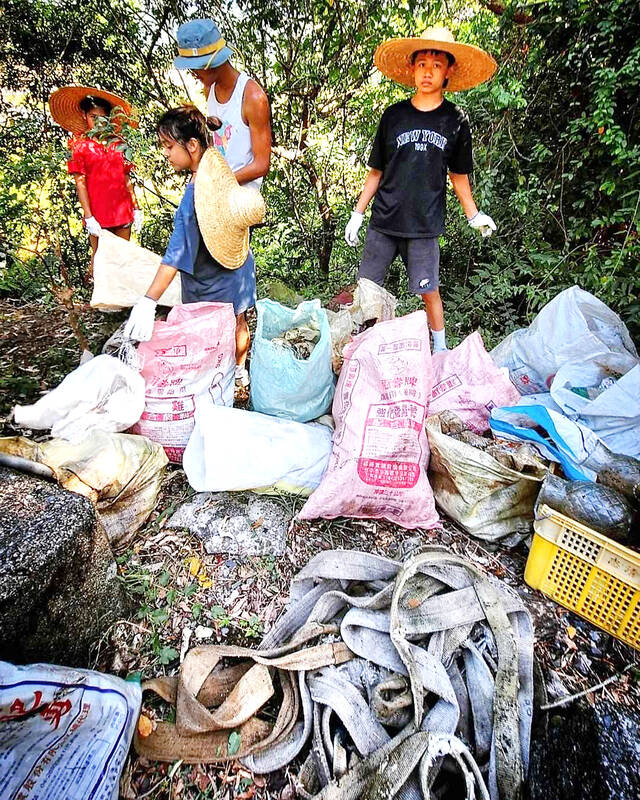Taiwan’s cities are a good bit cleaner than they used to be, but — as I discussed in my Sept. 25 column (“Is a cleaner countryside in Taiwan possible?”) — the same can’t be said for rural areas.
Litter that ends up where it shouldn’t is, at best, an eyesore. In many cases, it’s liable to impact wildlife or break down into potentially-harmful microplastics.
Each of Taiwan’s 22 counties and cities has a reporting mechanism through which the public can notify their local government of improper waste disposals. In some places, including Taipei and Taichung, whistleblowers are entitled to a financial reward if a litterbug can be identified and fined.

Photo: by Steven Crook
‘SHOCKING’
One resident who’s brought instances of illegal dumping to the attention of the authorities is Guillaume Brissaud, a Frenchman who’s been in Taiwan for 19 years.
The professional chef, who lives in a rural part of Yilan County’s Dongshan Township (冬山), admits to different layers of motivation.

Photo: by Steven Crook
“I’ve always been close to nature, and I walk through my neighborhood every morning and evening. Seeing trash in the bushes and along the riverbed is a source of personal discomfort,” he says.
Brissaud is also passionate about ocean conservation, and is acutely aware that what happens in Taiwan’s waterways has an impact on the marine environment. He’s midway through officially registering the NGO he co-founded, Wild Ocean Taiwan, saying he hopes it “can build the ocean conservation community, as it seems that existing organizations aren’t working well together.”
Describing the amount of trash he’s come across near his home as “shocking,” he explains that most of it appears to be household garbage, but there’s also some construction and agricultural waste. He suspects that the illegal dumping mostly happens at night.

Photo: by Steven Crook
Brissaud initially wanted to organize a cleanup, but his wife — who works for Society Of Wilderness (SOW, 荒野保護協會), a local environmental NGO — advised him to instead call the Environmental Protection Bureau (EPB) of Yilan County Government.
“They came immediately and said they’d take care of the garbage in the bushes and beside the road, but couldn’t do anything about the riverbed, because that’s the responsibility of a different agency,” he recalls.
The EPB helped Brissaud contact the First River Management Branch of the Water Resources Agency, part of the Ministry of Economic Affairs. The river management unit told him that, because of staffing shortages, it’d be a month before they could attend the location.

Photo: by Steven Crook
Five weeks passed and nothing happened. Then, a few weeks before I spoke with Brissaud, he spotted a dead Reeves’s muntjac on the bed of the creek, which for much of the year has no surface flow. “I reported it. They came quickly and removed the dead animal, but not the garbage,” he says.
More than two months after he first alerted the authorities to the state of the waterway, Brissaud got fed up with waiting and took matters into his own hands. In early September, he and 10 volunteers — nine locals from the adjacent indigenous community plus a member of Wild Ocean Taiwan from another part of the county — devoted a day to collecting and bagging as much trash as they could.
Some spots were dumping grounds for farming waste. At one site, they found hundreds of PET bottles, already in bags.

Photos courtesy of Guillaume Brissaud
“There were also numerous engine oil containers, lots of plastic trash, and yet more plastic bottles,” he says.
Asked how much waste they ended up removing, Brissaud replies, “I thought about weighing what we picked up, but there was way more than we expected and we got kind of overwhelmed. The day was super hot and we all got covered in ants.”
TaiwanPlus, the state-funded English-language TV channel, reported on the cleanup, and Brissaud hopes publicity will push the First River Management Branch to install cameras. Around-the-clock surveillance, he thinks, might reduce both the amount of rubbish and the authorities’ workload.
MIXED RESULTS
Since mid-2022, I’ve submitted more than 50 reports through Tainan’s online Chinese-language Citizen Mailbox (cmsweb.tainan.gov.tw/RWD/#/report), alerting the city government to the presence of garbage beside roads, on farmland and in woodlands. But the very first formal request I made to investigate what I guessed to be illegal dumping was to the Pingtung County Government.
While exploring the northeastern corner of the county in early 2022, I came across a section of slopeland that had become an unofficial trash dump. At home, I uploaded the photos I’d taken via the county government’s Web site. Detailed comments weren’t needed, I reckoned, because the images spoke for themselves.
Some days later, I received an email telling me that the morning after I’d sent in my report, Pingtung County’s EPB dispatched staff to the location in Sandimen Township (三地門). There they found “several black bags of garbage, two bundles of plastic sheets, plastic buckets, flower pots and other general waste,” but were unable to identify those responsible.
Noting that the land was within a Slopeland Conservation Area (山坡地保育區), they said they would order its owner to rectify the situation “within a time limit,” and that, if he or she failed to do so, penalties would be imposed. At the same time, the landowner was told to improve management of the plot, so as to avoid future problems of this kind.
It wasn’t clear how many days the landowner would be given to clear away the trash, and whether there would be a follow-up inspection, yet I found the response encouraging. Filing these reports is easy once you’ve done it a few times, so I’ve continued to send them in.
On occasion, the result is just what I wished for. A bike ride through Tainan’s Sinshih District (新市) prompted me to complain about a pile of trash beside a backcountry road. Within a couple of weeks, the city’s EPB told me they’d completed the cleanup; they even attached before and after photos of the site to their email.
Responding to another report I made, Tainan’s EPB said they’d not only cleared up the spent fireworks and firecracker fragments I’d come across on a levee road in Sinhua District (新化), but they’d also “liaise with the local River Management Branch to seek CCTV footage that might help identify the litterbugs.”
Also in Sinhua, I was glad to notice that a burned-out car close to Freeway 3 was removed soon after I’d notified the authorities.
While the EPB responds to every report, in some cases they’re unable or unwilling to take swift action.
After I notified them about a large amount of trash next to one of Gueiren District’s (歸仁) major roads, officials informed me via email that they’d send a letter to the property’s owner, directing him or her to “make improvements.” Having seen the alacrity with which some people here ignore laws and regulations they find inconvenient, I wasn’t confident a mere letter would bring about any change.
When I complained about abandoned cars in Cigu District (七股) — not far, it should be said, from Taijiang National Park (台江國家公園) and its waterbird wintering grounds — the response reassured me of just one thing: That all relevant procedures would be followed, not that the actual problem would be solved.
LIMITS ON WHAT CAN BE DONE
Local governments’ efforts to keep the countryside clean are constrained not only by their financial and human resources, but also by the ordinances that provide a legal basis for entering private property and issuing fines.
The “trash waterfall” (垃圾瀑布) I came across not far from Thousand Buddha Bodhi Temple (千佛山菩提寺) in Tainan’s Guanmiao District (關廟) was truly disgusting, yet the authorities decided they could do no more than issue a letter “asking the landowner to clean up and make improvements.”
Despite the appalling state of the land, it didn’t fall within the scope of the Tainan City Self-Government Ordinance for the Management of Vacant Land and Vacant Buildings, according to an emailed response from the EPB, the reason being that, “there’s no stagnant water at the site, so no danger of breeding mosquitoes.”
In certain circumstances, the ordinance empowers city officials to remove waste from private land, then recover the cost of the cleanup from the plot’s owner.
As the existing enforcement framework doesn’t appear to deter those intent on dumping waste improperly, it’s perhaps time to consider radical measures.
Imposing strict liability on landowners, making them entirely responsible for keeping their properties clear of non-biodegradable trash, would likely result in the proliferation of ugly fences and CCTV infrastructure.
Moving much more quickly to ban all single-use items would be a good start. At the same time, the government should expand the existing 4-in-1 recycling system, so as to create demand for other materials that are often illegally dumped. If people could sell old bricks and broken cisterns left over from house renovations, they’d be less inclined to toss them into remote gullies. That may sound like bribing people to do the right thing, but we have to recognize the reality of human nature if we’re to protect Mother Nature.
Steven Crook, the author or co-author of four books about Taiwan, has been following environmental issues since he arrived in the country in 1991. He drives a hybrid and carries his own chopsticks. The views expressed here are his own.

In the March 9 edition of the Taipei Times a piece by Ninon Godefroy ran with the headine “The quiet, gentle rhythm of Taiwan.” It started with the line “Taiwan is a small, humble place. There is no Eiffel Tower, no pyramids — no singular attraction that draws the world’s attention.” I laughed out loud at that. This was out of no disrespect for the author or the piece, which made some interesting analogies and good points about how both Din Tai Fung’s and Taiwan Semiconductor Manufacturing Co’s (TSMC, 台積電) meticulous attention to detail and quality are not quite up to

April 21 to April 27 Hsieh Er’s (謝娥) political fortunes were rising fast after she got out of jail and joined the Chinese Nationalist Party (KMT) in December 1945. Not only did she hold key positions in various committees, she was elected the only woman on the Taipei City Council and headed to Nanjing in 1946 as the sole Taiwanese female representative to the National Constituent Assembly. With the support of first lady Soong May-ling (宋美齡), she started the Taipei Women’s Association and Taiwan Provincial Women’s Association, where she

Chinese Nationalist Party (KMT) Chairman Eric Chu (朱立倫) hatched a bold plan to charge forward and seize the initiative when he held a protest in front of the Taipei City Prosecutors’ Office. Though risky, because illegal, its success would help tackle at least six problems facing both himself and the KMT. What he did not see coming was Taipei Mayor Chiang Wan-an (將萬安) tripping him up out of the gate. In spite of Chu being the most consequential and successful KMT chairman since the early 2010s — arguably saving the party from financial ruin and restoring its electoral viability —

It is one of the more remarkable facts of Taiwan history that it was never occupied or claimed by any of the numerous kingdoms of southern China — Han or otherwise — that lay just across the water from it. None of their brilliant ministers ever discovered that Taiwan was a “core interest” of the state whose annexation was “inevitable.” As Paul Kua notes in an excellent monograph laying out how the Portuguese gave Taiwan the name “Formosa,” the first Europeans to express an interest in occupying Taiwan were the Spanish. Tonio Andrade in his seminal work, How Taiwan Became Chinese,